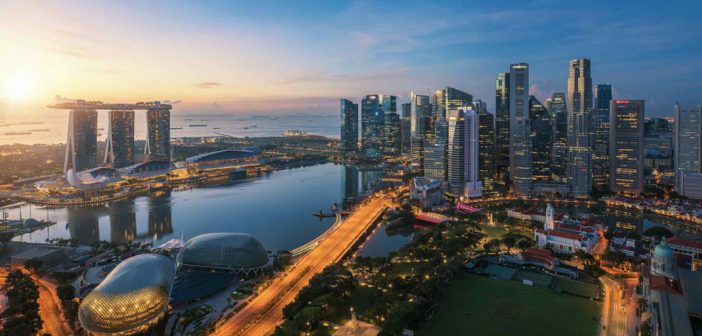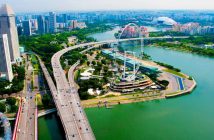Purchasing real estate in Singapore means investing in Southeast Asia’s de-facto financial capital and one of the world’s richest countries. Despite being one of the most expensive cities in the world, Singapore’s real estate market is a secure long-term option due to restricted land availability and consistently high international demand.
This article covers the basics of investing in Singapore’s real estate industry such as property taxes, ideal locations, and how to make money from your property investment.
How to earn money from property investment in Singapore
Singapore Rental Property
Renting out your Singapore property is one of the ways to make money from it. To determine the rental yield, sum together all of your annual rental revenue and convert it to a percentage of the property value.
For instance, if you paid S$800,000 for a home and rented it out for S$5,000 per month, you’d make S$60,000. 7.5% (S$60,000 x 100 / S$800,000) is the rental yield.
Generally, greater rental yields are preferable since they help you to earn a better return on investment (ROI) before selling your home. In Singapore, it is fairly typical for owners to use the rent they get to pay off their mortgages.
Resale Property in Singapore
Property values in Singapore are likely to rise over time. This is why there are so many HDB resale apartments on the market after they have completed the Minimum Occupancy Period.
This strategy is known as capital appreciation, and it is one of the most effective ways to make a profit from your property. It also applies to private properties. It occurs when you sell your property for a better price than you bought it. For example, if you purchase an HDB 3-room for S$500,000 and sell it 5 years later for S$900,000, you’ve made a S$400,000 capital gain. Capital appreciation also applies to private properties, but no MOP is applicable.
Can Foreigners Purchase Real Estate in Singapore?
Yes. Foreign investors may purchase condominium properties in their names and receive a freehold title. As a result, foreigners have the same rights as Singaporeans when purchasing non-landed property.
Foreign investors can also own bungalows, houses and other landed properties that are less than six storeys tall. However, if you are not a Singaporean citizen, you must get official authorisation first. It’s a lengthy procedure in which you must demonstrate that your land ownership would “help Singapore’s economy” – a somewhat ambiguous phrase.
Typically, this is accomplished by paying a large sum of money to Singapore to purchase land. If you wish to acquire any form of land in Singapore as a foreigner, expect to pay at least SG$20,000,000.
When it comes to taxation, things become even more complicated. Foreigners pay more tax than natives and permanent residents. However, international investors are treated generally equally to residents when it comes to the opportunity to own property in Singapore.
Property Taxes in Singapore
You must pay taxes when purchasing property in Singapore. An annual property tax is also required. Foreigners are subject to much higher taxes than permanent residents and citizens of Singapore. Additionally, you must pay a Buyer’s Stamp Duty (ABSD). It is computed as a percentage of the entire transaction price. Singaporeans purchasing their first home aren’t required to pay ABSD.
However, Singaporeans purchasing a second house must pay 7%. This is increased to 10% for any future purchases. If you are a Singapore permanent resident, ABSD is a little stricter. PRs are required to pay 5% on their first property and 10% on subsequent ones. Foreigners, on the other hand, must pay an additional 15% on any real estate acquisition in Singapore.
Annual property tax in Singapore is levied at a progressive rate based on the annual rental value. This is a valuation metric that applies whether or not you lease your property. Foreigners must pay an additional 10% to their expected annual rate. Furthermore, owner-occupied homes must pay an additional 4% on the tax rate, while rental units must pay an additional 10%.
Non-residents pay a flat 20% tax on rental income in Singapore. This tax is around 15% for inhabitants. Insurance, renovations, repairs and property taxes can all be deducted, which dramatically reduces the rental tax rate.
Where to buy property in Singapore
Singapore isn’t a large nation. It is, in reality, one of the world’s smallest. However, the city-state has multiple distinct districts with varying price ranges, moods and ease of access to the MRT, Singapore’s most widely used form of transportation. Upcoming new condominium developments such as Terra Hill and Grand Dunman has hundreds of units, located at a strategic location with excellent facilities. It is the ideal location to invest in property for citizens and foreign investors.





2 Comments
No doubt this is an excellent post! I got a lot of knowledge after reading this, thank you! https://www.drywallhalifax.com/
The real estate industry is subject to government regulation at the local, state, and federal levels, encompassing zoning ordinances, building permits, environmental regulations, and tax policies. Compliance with these regulations is essential for developers, property owners, and real estate professionals to mitigate legal risks and ensure project viability.skilled tradies